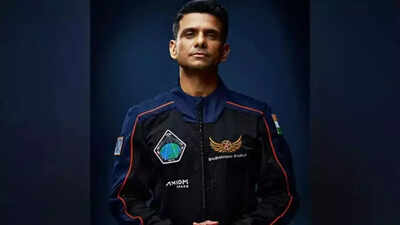Indian Astronaut to Connect with Students and ISRO Scientists from Space
Indian astronaut Shubhanshu Shukla, currently on board the International Space Station (ISS) as part of the Axiom-4 (Ax-4) mission, is scheduled to interact with students and scientists at ISRO on Friday, July 4. The interaction will be facilitated via ham radio, marking a unique opportunity for students to engage with an astronaut in real-time.

The Ax-4 mission, a 14-day commercial spaceflight organized by Axiom Space, includes four astronauts involved in groundbreaking scientific research that could revolutionize long-duration human spaceflight.
The event is part of the ARISS (Amateur Radio on the International Space Station) program, an international initiative designed to connect students globally with astronauts in orbit, fostering interest in STEM education. The telebridge at the U R Rao Satellite Centre in Bengaluru will serve as the venue for the interaction.
The interaction, facilitated by the Amateur Radio on the International Space Station (ARISS), will occur at the U R Rao Satellite Centre (URSC) in Bengaluru through a telebridge station. Communication will be relayed via the K6DUE ground station. According to PTI reports, the session is scheduled for 3:47 PM IST (10:17 UTC) on Friday.
Ham radio, also known as amateur radio, is a licensed communication system operating on radio frequencies designated for non-commercial use. Popular among enthusiasts, it serves as a crucial communication tool during emergencies when standard lines fail.
In space missions, ham radio offers a reliable and direct communication line between astronauts and students or amateur operators on Earth. This personal interaction enhances science education, allowing students to connect with a real astronaut in space.
While aboard the ISS, Shubhanshu Shukla is involved in several experiments:
Researchers are exploring microalgae for their potential as a sustainable, nutrient-rich food source for astronauts. These organisms also play a vital role in oxygen recycling and waste management. Shukla has planted sample bags of microalgae and is capturing high-resolution images of their growth. Studying the effects of microgravity on algae growth could lead to the development of closed-loop life-support systems, essential for missions to the Moon, Mars, and beyond.
This project employs virtual reality headsets to assess cognitive performance in microgravity. Astronauts wear headsets and engage in attention-based tasks while their brain activity is monitored using functional near-infrared spectroscopy (fNIRS). This data helps scientists understand how space travel impacts mental acuity, motor function, and memory – crucial insights for future deep space exploration where astronauts must perform critical tasks under stress in confined environments.
This research focuses on combining biometric data with AI-based mission analytics to track the impact of space on cardiovascular health and balance systems. By utilizing real-time data analysis and predictive models, this project aims to transform in-flight medical monitoring and potentially enable remote diagnostic devices for use in rural or emergency areas on Earth, highlighting the potential of space research to drive medical innovation.
Newer articles
 Black Caps Set for Blockbuster Home Summer Against Cricket Giants
Black Caps Set for Blockbuster Home Summer Against Cricket Giants
 Smith Aims for Second Test Return After Unique Baseball Cage Recovery
Smith Aims for Second Test Return After Unique Baseball Cage Recovery
 Gujarat Cricket Association Gears Up to Launch T20 League in 2025-26 Season
Gujarat Cricket Association Gears Up to Launch T20 League in 2025-26 Season
 Sharma Reveals Heart-Stopping Moment of Yadav's Game-Changing Catch in T20 World Cup
Sharma Reveals Heart-Stopping Moment of Yadav's Game-Changing Catch in T20 World Cup
 Najmul Hossain Shanto Resigns as Bangladesh Test Captain After Sri Lanka Defeat
Najmul Hossain Shanto Resigns as Bangladesh Test Captain After Sri Lanka Defeat
 Daren Sammy Fined, Receives Demerit Point for Umpire Criticism After Test Match Controversy
Daren Sammy Fined, Receives Demerit Point for Umpire Criticism After Test Match Controversy
 Ex-India Star Engineer Slams ECB's Pataudi Trophy Renaming, Questions Anderson-Tendulkar Choice
Ex-India Star Engineer Slams ECB's Pataudi Trophy Renaming, Questions Anderson-Tendulkar Choice
 Man City Title Stripping: Unprecedented Chaos Looms for Premier League Amid Financial Allegations
Man City Title Stripping: Unprecedented Chaos Looms for Premier League Amid Financial Allegations
 Chess Grandmaster Anish Giri Defends Hans Niemann, Cites Lack of Evidence in Cheating Scandal
Chess Grandmaster Anish Giri Defends Hans Niemann, Cites Lack of Evidence in Cheating Scandal
 Jin's Solo Concert in Korea: A Reunion with ARMY, Surprise Guests, and Electrifying Performances
Jin's Solo Concert in Korea: A Reunion with ARMY, Surprise Guests, and Electrifying Performances